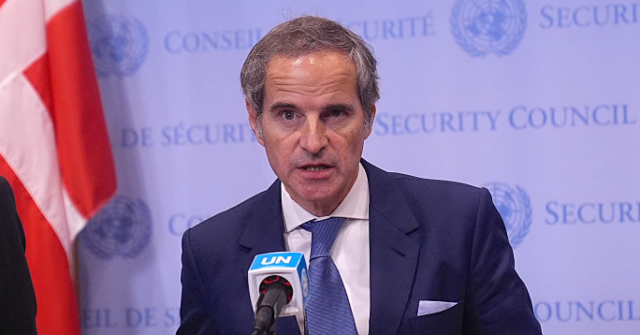Rafael Grossi, director of the International Atomic Energy Agency (IAEA), on Friday offered to travel to Iran and assess the damage to its nuclear sites following Israel’s airstrikes.
The IAEA is the United Nations nuclear watchdog agency. Its Board of Governors has been meeting this week, with Iran’s nuclear program at the top of its agenda.
On Thursday, the board passed a resolution holding Iran in violation of its nuclear non-proliferation obligations for the first time since 2006. Israel launched its campaign against the Iranian nuclear program the night after the resolution passed.
Grossi, who has grown steadily more exasperated with Iran’s lies and evasions over the past few years while resolutely calling for diplomacy instead of military action, maintained his position in remarks to the board of governors on Friday.
“I call on all parties to exercise maximum restraint to avoid further escalation. I reiterate that any military action that jeopardizes the safety and security of nuclear facilities risks grave consequences for the people of Iran, the region, and beyond,” he said.
“Despite the current military actions and heightened tensions, it is clear that the only sustainable path forward — for Iran, for Israel, the entire region, and the international community — is one grounded in dialogue and diplomacy to ensure peace, stability, and cooperation,” he insisted.
Grossi reportedly called Israeli President Isaac Herzog on Friday to discuss the damage to Natanz.
“This development is deeply concerning. I have repeatedly stated that nuclear facilities must never be attacked, regardless of the context or circumstances, as it could harm both people and the environment. Such attacks have serious implications for nuclear safety, security, and safeguards, as well as regional and international peace and security,” the IAEA chief said.
At the time of Grossi’s statement to the IAEA governors, only one of Iran’s three major uranium enrichment sites had been struck by Israel, the large nuclear complex at Natanz. Grossi said the latest information at his disposal indicated no elevated radiation levels at Natanz.
Israeli Prime Minister Benjamin Netanyahu confirmed Natanz was a major target of Thursday night’s military action.
“Iran has produced enough highly enriched uranium for nine atom bombs — nine. In recent months, Iran is taking steps that it has never taken before, steps to weaponize this enriched uranium. And if not stopped, Iran could produce a nuclear weapon in a very short time,” he said.
“We struck at the heart of Iran’s nuclear enrichment program. We struck at the heart of Iran’s nuclear weaponization program. We targeted Iran’s main enrichment facility in Natanz. We targeted Iran’s leading nuclear scientists working on the Iranian bomb,” he said.
Iranian state media reported on Friday that Israel appeared to be targeting a second nuclear facility, Fordow, with weapons powerful enough to damage the underground base. Witnesses reported hearing two large explosions near Fordow, which is located in northern Iran. Iranian state media claimed an Israeli drone was shot down somewhere near the Fordow facility.
The Israel Defense Forces (IDF) said on Friday it also attacked Iran’s third major nuclear facility, located near Iran’s second-largest city, Isfahan. The IDF did not provide any details about the Isfahan strike.
Israeli officials did give some more details about the strikes on Natanz, claiming underground chambers housing a “multi-level enrichment hall housing centrifuges, electrical rooms, and other supporting infrastructure” were destroyed.
The Israelis said “critical infrastructure enabling the site’s continued operation and advancement of the Iranian regime’s nuclear weapons project” was also destroyed at Natanz.
Iranian Foreign Minister Abbas Araghchi wrote to Grossi on Friday asking the IAEA to explicitly condemn Israel’s “aggression against Iran’s nuclear facilities.”
The Iranian Foreign Ministry said Araghchi demanded “immediate action by the director general to convene an emergency meeting of the IAEA Board of Governors to address the situation.”
The U.N. Security Council (UNSC) scheduled an emergency meeting and closed consultations on Friday afternoon, as requested by Iran. Grossi was listed as one of the officials who would brief the meeting.
IAEA officials told the Wall Street Journal on Friday that a special session of the board of governors could be convened on Monday morning. The meeting had not been announced as of Friday afternoon.
Read the full article here
